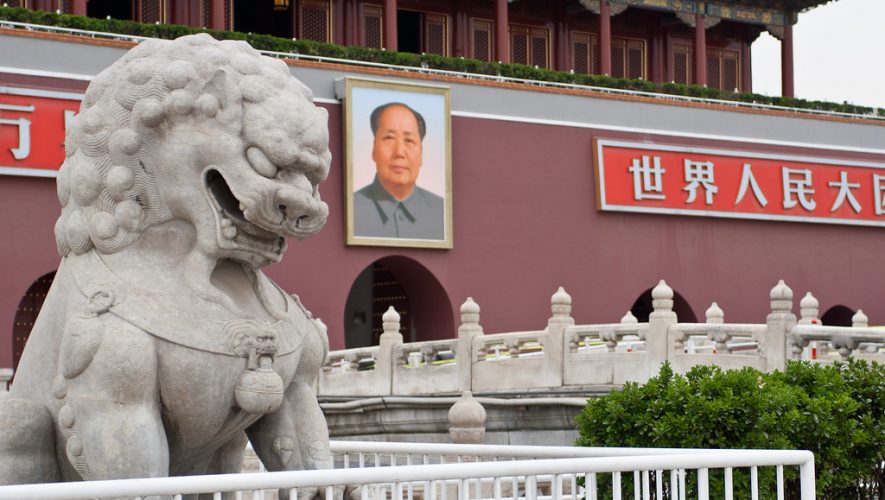In recent years, worldwide authoritarianism has been exposed to a new sort of “nostalgic nationalism,” where leaders increasingly rely on extreme loyalism and patriotic sentiment to promote an agenda. Within this genre of civic manipulation is a concerning phenomenon: heads of state reverting to tactics of bygone eras and rose-tinted propaganda to fuel support and monopolize power. In China, President Xi Jinping has capitalized on Mao Zedong’s everlasting appeal—and instilled his own degree of Mao-centric propaganda—as a means of gathering support for policy and amplifying his power.
From 1949 until his death in 1976, Mao Zedong held virtually unchallenged rule over the People’s Republic of China as the chairman of the Chinese Communist Party (CCP). Though China’s leaders have embraced certain limited reforms in the past four decades—from Zhou Enlai’s successes with foreign diplomacy to Deng Xiaoping’s economic “openness”—Mao’s shadow still looms large in the twenty-first century. Loyal Maoists “operate scores of web sites” promoting his legacy, promulgating the notion that, “separated from Mao, the Communist Party has no glory.” Mao’s mausoleum in Beijing sees scores of tourists and pilgrims travelling to view his embalmed body. As historian Ross Terrill observed, Mao has been “added to the panoply of faith” in China, as “nightclub singers in Beijing croon songs that cite Mao’s words” and “Red Guards wave Mao’s little red book.”
Though Mao’s ultimate impact cannot be understated, Xi Jinping has made a case for himself as a similarly exceptional ruler. There is no disagreement among observers that Xi’s ideological priorities have permeated the ranks of Chinese government and culture; in fact, the Chinese Politburo granted Xi the status of lingxiu, an honorific title for highly revered leaders that was essentially reserved for Mao exclusively.
So what has enabled Mao’s enduring appeal in the Chinese popular consciousness? This so-called “red memory” is a two-pronged phenomenon. As professors Iza Ding and Jeffrey Javed noted, older generations derive Mao nostalgia from the quality of their lives during his rule, while younger people rely on official state narratives to form their opinions. In the former case, even those who had issues with aspects of the Mao era seem to separate the period from Mao himself, not feeling that his shortcomings justify dismissing his influence as a trailblazer. This trend is a manifestation of “reflective nostalgia,” a “simultaneous acceptance of the present and romanticization of the past.” Xi has exploited these sentiments to gain political capital. For example, Xi’s anti-corruption campaign is seen as anecdotally effective by many of the “nostalgic” population interviewed by Ding and Javed, who favorably recall Mao’s efforts to root out corruption.
The CCP, spearheaded by Xi, has also used propaganda to create positive associations with Mao—and by extension, authoritarian leadership—in order to cultivate support and a following. Under Xi, Chinese classrooms have been directed to instill a higher degree of “ideological education,” including classes on Mao Zedong Thought and Chinese Marxist theory. The curriculum is present in hundreds of thousands of lower schools and thousands of universities. The courses are critical to Xi as they are designed to lend legitimacy to his policy goals.
Mao’s popularity has arguably risen in recent decades; portraits hang over Tiananmen Square and millions visit his childhood hometown each year. Xi has even been known to mimic Mao’s attire, including a proclivity towards high-waisted pants. Instead of carving a new legacy for China, Xi has relied on Mao’s still-commanding presence to normalize novel government initiatives.
Xi has also capitalized on Mao’s rhetoric to seize power and codify his agenda. Xi often uses language reminiscent of Mao, describing his early life as a humble idealist in rural China prior to ascending the ranks of the CCP. Red Star Over China, a 1937 book by journalist Edgar Snow, contained detailed interviews with Mao which described a “picture of detail and frankness, of gentle humor, and of the revolutionary precision of the mind of [the] Chairman,” through various stories of his industrious youth and politically charged rise. Xi, in parallel fashion, has written autobiographically about his younger days, which he allegedly spent laboring in the rural countryside. Through this recounting, Xi has steered policy and national focus by positioning himself as a leader who struggled alongside the common man.
Xi’s larger policy goals have been cemented in the Chinese canon in a manner akin to Mao. Xi has formulated a “grand strategy” for China, similar to Mao’s “Leaning to One Side” strategy, which entailed absolute opposition to perceived US imperialism and capitalism. Xi’s policy blueprints include the Belt and Road Initiative, a series of major trade and infrastructure undertakings, and the “Chinese Dream” ideal, which promotes a blend of spiritual identity, nationalism, and reform. It has been noted that Xi is a “more visionary and strategic thinker than his predecessors,” who lacked such ambitious plans. While the Chinese leaders between Mao and Xi often consulted advisors and the Politburo in formulating foreign policy, Xi has dismissed consensus to become more monolithic.
Xi’s domestic policy, backed and legitimized by Mao nostalgia, has transformed him into a commanding figure. As mentioned, Xi’s anti-corruption campaign, a staple component of his agenda, has been heavily supported by a number of those who romanticize the purported “purity” of the Mao era. However, Xi is dismantling a series of critical reforms “under the guise of fighting corruption,” as a way to accumulate unchecked power.
The CCP has consistently looked toward Maoist strategies in other policy areas. For instance, an invasive surveillance program is being tested under the name “Sharp Eyes,” which is derived directly from a Maoist slogan. Xi has also promoted increased party intervention in private enterprise despite China’s supposed economic reforms. And above all, “Xi Jinping Thought” has permeated official publications, institutions, and schools, consecrated alongside the ideology of Mao. The proliferation of Xi’s belief system throughout modern China is a practice essentially not seen since the Mao era. Xi has not only taken advantage of China’s widespread admiration of Mao, but effectively expanded on it and mirrored his tactics to create a new cult of personality.
Xi has balanced his own ambitions with popular sentiment; in other words, his control and legitimacy come from the bottom up and the top down. In fact, as some have argued, Xi’s “driving need to rehabilitate Mao” is both out of “practical necessity”—the feeling that loyal Maoists would criticize the shortcomings of Xi’s government if he strayed from Mao—and “a sincere emotional attachment to Mao and his era.” Perhaps, cynically, Xi has a deeper desire to extract absolute power from his rule. Or, Xi is actually a product of the Mao era himself, and has a desire to revive the professed purity and righteousness of his formative years.
This phenomenon is not exclusive to China. Vladimir Putin has accomplished something similar in regards to Joseph Stalin. Putin has tended to hold Stalin in high regard and focus on certain aspects of Soviet-era rule to build his own legitimacy and provide the basis for imperial ambitions, like the annexation of Ukrainian and Georgian territory. Even in the United States, President Donald Trump has cultivated his own cult of personality, rallying behind a slogan of “Make America Great Again” that Ronald Reagan used in his 1980 presidential campaign.
It is important to confront how myriad factors can engender a cult of personality, and how certain strategies are used to manipulate people and exert control. As the world faces a rise in nationalism and strong-willed leaders, recognizing these tactics is the first step in combating them.



